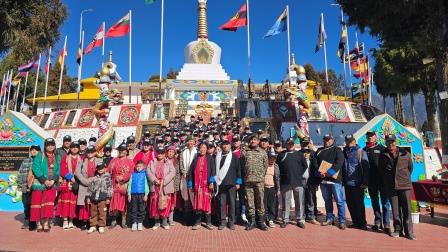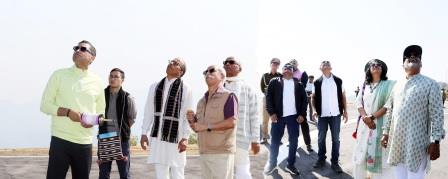-
Vacation ends in tragedy; two tourists die in frozen Sela…
-
Governor urges students to dream big, nurture positive…
-
Tourist from Kerala die in icy Sela lake, another…
-
Arunachal Pineapple Festival Bagra 3.0 kicks off
-
Indian Army organises ESM meet to commemorate Armed Forces…
-
 Veterans' Day celebrated with reverence and pride in Tawang
Veterans' Day celebrated with reverence and pride in Tawang
-
 Governor participates in kite-flying festival
Governor participates in kite-flying festival
-
Arunachal Pradesh set to receive 152 NCC Cadet Volunteers as…
-
Mein inaugurates hostel building at Pali Vidyapeeth, Announces support
-
State-Level Workshop on Career Guide Book and “My Career Advisor”…

Tawang, Sep 2: As part of the Golden Jubilee celebrations of the Arunachal Pradesh Legislative Assembly, Dorjee Khandu Government College, Tawang, hosted a vibrant debate competition and lecture series under the APLA@50 Outreach Connect initiative. The programme brought together students, faculty, and dignitaries in an atmosphere of spirited dialogue, learning, and reflection on democracy.
The debate centred on the motion: “Adopting a Uniform Civil Code ensures equal rights for all and strengthens national unity.” Students engaged in thought-provoking arguments both in favour of and against the motion. Participants highlighted themes of equality, justice, social harmony, and the challenges of diversity, showcasing the depth of their understanding of constitutional issues. The audience witnessed not just a contest of words but an exercise in critical thinking and democratic reasoning.
A key highlight of the event was the keynote address delivered by Prof. Ashan Riddi, Assistant Professor, Department of History, RGU whose speech offered students a rare historical perspective on Arunachal Pradesh’s transformation from its days as an ungoverned land to becoming an integral part of the world’s largest democracy. Prof. Riddi eloquently traced the evolution of democratic governance in the state, highlighting the struggles, milestones, and progress achieved over the last five decades. His words gave students a deeper appreciation of their place in the democratic fabric of the nation and inspired them to take up active roles in civic life.
The day’s proceedings concluded with a vote of thanks delivered by Khangshung Jugli, Joint Secretary, APLA, who praised the college community and the students for their enthusiastic involvement. He underlined the importance of initiatives like APLA@50 Outreach Connect in creating awareness about the functioning of democratic institutions and in nurturing a generation of informed citizens. Jugli expressed hope that such interactive programmes would bridge the gap between the legislature and the younger population, making democracy more participatory and meaningful.

Kenter Joya Riba
(Managing Editor)She is a graduate in Science with post graduation in Sociology from University of Pune. She has been in the media industry for nearly a decade. Before turning to print business, she has been associated with radio and television.
Email: kenterjoyaz@easternsentinel.in / editoreasternsentinel@gmail.com
Phone: 0360-2212313

